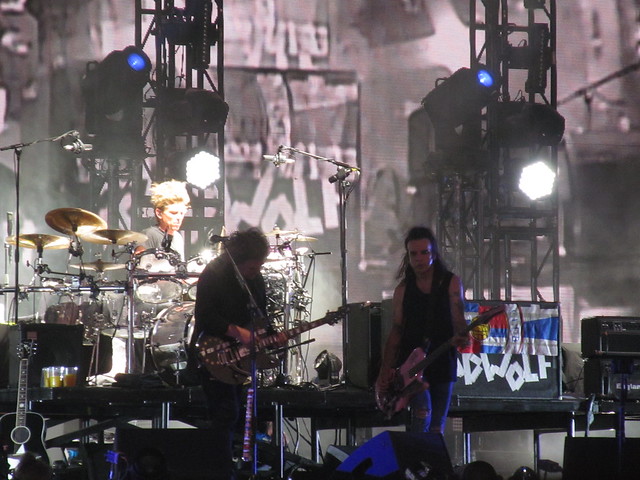
THE CURE + FRIENDS - London Hyde Park - 07 July 2018
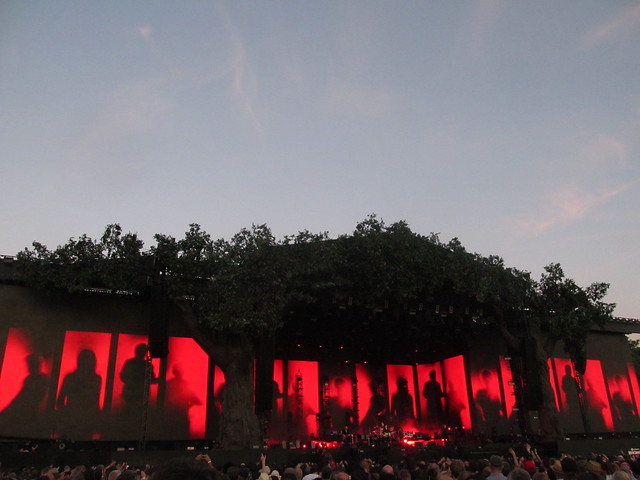
CURES! THAAAAASANDS OF THEM!!
The Cure. Ride. Interpol. The Twilight Sad. Goldfrapp. This Will Destroy You. Slowdive. Kathryn Joseph. Pumarosa. Pale Knives. Look at that bill. I’d pay good money to see almost every band on this bill on their own, let alone all together. And whilst for some, it’s too big, too fucking hot, too many people, this is a unique event – a near enough hand-curated bill of Robert Smiths favourite bands, but also, the strongest single day bill I have seen in decades.
Of course, the day I saw that bill I had two immediate and conflicting thoughts : The first I have to go to this! And the second… Oh shit, I’m seeing Roger Waters in Birmingham that night.
I can’t have both. So I buy tickets, and worry about it later. Certainly, the first thing I notice is this is also the only British Summer Time Hyde Park gig where the section in front of the stage isn’t sold for twice as much as everywhere else. Sure there’s expensive tickets, but they are only for a smaller section to the right. If you want to get right under Robert Smiths face you don’t have to pay more, unlike every other gig that very clearly has a Second Class option.
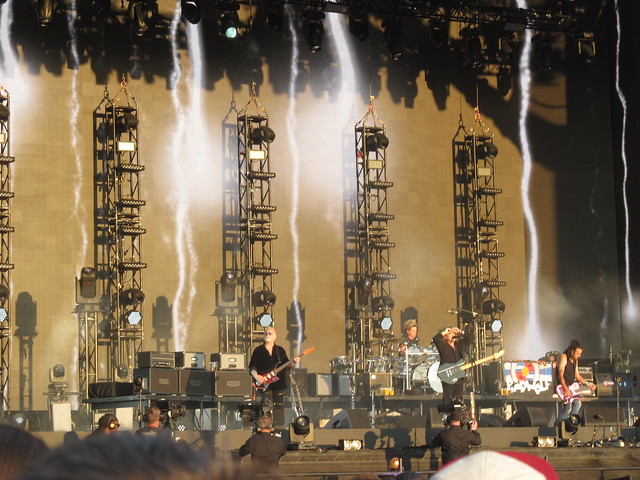
It’s an exhausting, exhaustive day : I manage to see at least a bit of every band on every stage. And over the twelve hours (from the moment we all tend to convene at 10.30am, to the last dying notes of “Killing An Arab” 12 hours and 4 minutes later), it’s an assault course of music, interspersed with randomly bumping into at least thirty people. To start with, there’s a somewhat informal Meeting of ‘The Cunts’* [that is, Twilight Sad fans who have flown long distances to be here] at 10.00am. A couple of hours later – and with too much alcohol in us – we flock to Hyde Park.
[* "A Greeting Of Cunts" is the self-appointed name for a plural of Twilight Sad fans : like a murder of crows, but listening to miserable pop music.]
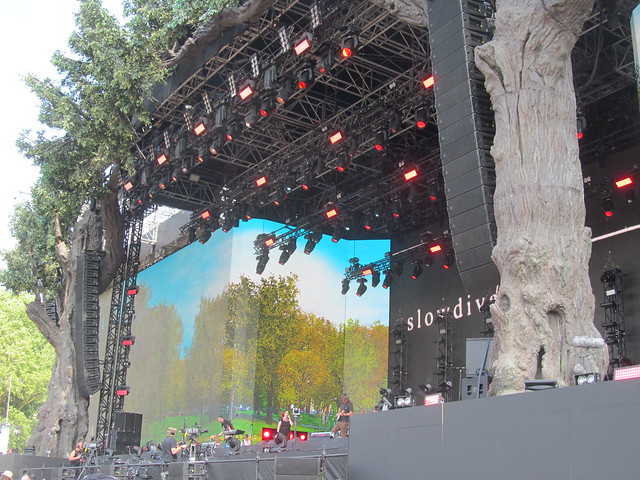
Inside the enormous park – and the snaking line of admission – there are queues everywhere. Queues to buy t-shirts. Queues for food. Queues for water. Queues for … everything. Queues to get in. Queues to get out. Queues to… eventually we enter the main stage arena, and catch the first band – Pale Waves – opening on the enormous stage. It’s fair to say that the band aren’t quite used to reaching the back of the crowd, yet. Next up, it’s a solid walk 7 minutes up the field to the stage that houses Pumarosa. Their dense blend of Siouxsie-esque sound and rhythms is growing on me, but it sounds oddly like Sunscreem covering Nico. At this point, it’s already hotter than the surface of the sun, and I’m on my second application of suncream.
In the usual game of indie Tag, as soon as Pumarosa come to a close, Slowdive start at the other end of the field seven minutes away. I make it in time for this band, who I’ve never actually seen before. On record, Slowdive are a shimmering, untouchable monster, gorgeous, yet somehow not quite tangible, and the music sounds like instruments – but not quite. On stage, the band are a muscular, powerful beast, with a flex and power that isn’t on the record. The sound is strong, and the band assertively state their case with a set that is forward looking ; with songs from last years “Slowdive” standing next to quarter century old classics from the age of cassette singles, blending seamlessly in a context where the older songs become better by the new ones standing next to them, and recontextualising then and now. After their full set, it’s another run up to the top of the field, for a rare live appearance by This Will Destroy You. Burrowing deep in a beautiful post rock furrow, the genre is crowded and impenetrable to some, but ultimately staggeringly rewarding, if you open your heart and feel. Sure, you may know Sigur Ros and Mogwai if you’re lucky, but go deeper, and bands like this move far beyond the normal emotional position into something beyond words, something like music and sound, but more. This Will Destroy You make a face meltingly beautiful noise, and it’s the band that come on after them on the same stage are even better than that.
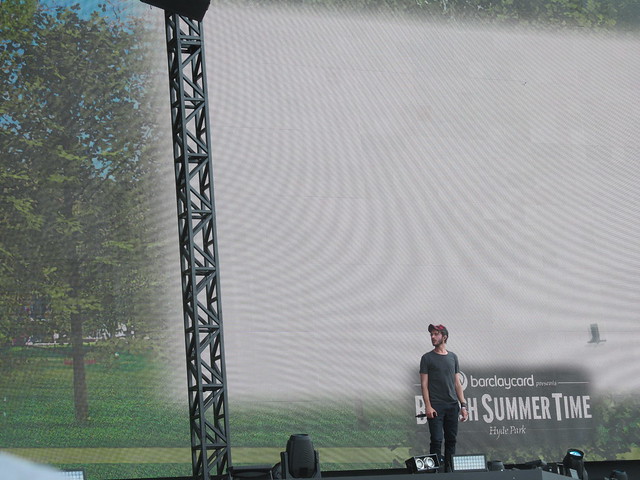
It’s another sunsplashed run down the field to catch Editors who are strongly in support of their sixth album “Violence”. As a record, it’s a gruelling, scartissue run of emotions that pulls no punches. As a band, Editors are fluent in their sound. I’m baffled by idiots who lament the loss of their earlier jingle-jangle era : good as it was, the depth, maturity, and evolution the band have brought reminds me of no one so much as The Cure, who grew far beyond their initial promise into something even better than that. Songs like “Violence” itself, “No Harm” and “Cold” are coiled snakes of intelligent emotion, the band burning with a knowledge of things you have not seen, a mastery of their craft that few achieve, and an ability to wield open wounds into essential pieces of art. The tension/release dynamic the band now work on is a glorious thing, the songs becoming dramatic, but not histrionic, and the material being refreshingly honest. Editors were in danger of painting themselves into a creative corner at the midpoint, and now have a second wind of creativity that sees them exploring and evolving with every song. Sadly, given the clashes of timing, Editors finish the second near enough my favourite band in the world start on another stage, so I have to leave Editors mid song to catch The Twilight Sad.
And this is probably the biggest crowd that band have ever played to. Being the first announced show of their short summer tour, it’s also the one with the highest attendance of Cunts* Travelling A Very Long Way To Greet In Public. The band appear briefly and soundcheck half a song, then reappear shortly to play a compelling 40 minute set that feels a bit like having your grieving heart ripped out and put back in your soul so it works a little better.
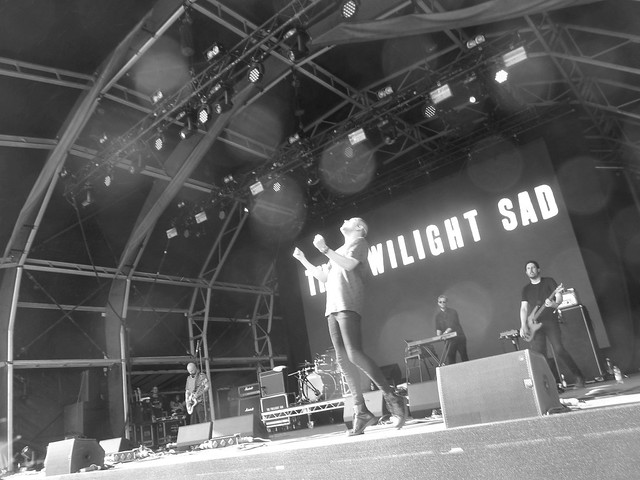
Oh, such hyperbole. But the songs are such fluid things – built on coiled and rising pulsing grooves, “Last January” means something different to everyone here, but there’s a couple of people lines for me, when James Graham voice rises and the lyric cuts through you are too old to fare on your own, which means something to me.There’s two new songs – the pounding “VTR” that is already one of the best songs they have, and “Arbor” which is a delicate shimmer. Alongside a Greatest-Hits-From-A-Band-That-Hasn’t-Had-Hits (Last January, Don’t Move, There’s A Girl In The Corner, And She Would Darken The Memory), there’s also a final cover of Frightened Rabbit’s “Keep Yourself Warm” that is, once again, powerful and emotional. The history of the two bands seems tightly wound each other, with each band egging the other on to succeed. With the loss of Scott, it’s almost as if The Twilight Sad have become more determined to continue in an act of defiance. Depression is a motherfucker,and living with an invisible monster that is inside your head and often can’t be seen until it strikes is a cruel battle. A state of constant war that one never knows is being fought, and so is always being fought. The emotions aren’t as high and hard as Leeds, but there’s a cathartic wave that seems to spread over the crowd during this song, an acknowledgement of a certain state of affairs, that somehow, the monster came and took one of our own, and we have to keep surviving. I’ve seen The Sad a lot over the years, and this felt like the peak of a small mountain, a victory on a battlefield, an ascent to a plateau where you can see not only where the band have come from, but also where they are going. The small rooms won’t be big enough for this band for much longer. Certainly, Robert Smiths fostering of them has brought them to peoples minds, but – and this is the crucial point – it’s the greatness in the band themselves that will keep the band in our minds. The songs speak for themselves.
I’m practically incapable of speaking after that, so Goldfrapp are a huge wrench in emotional flavour and I’m not really capable of being where Goldfrapp are, even if I wanted to be. In fact, I’m trying but not really ready for Kathryn Joseph playing in a tiny bandstand at the foot of the field.
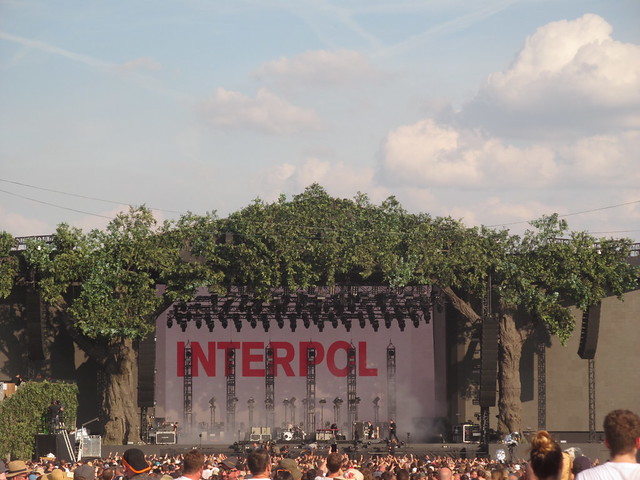
Interpol are the main support, as such – being the penultimate band just before The Cure. They’ve been through a lot over the years, and changed. They are very good at what they do, even though they are all clad in suits and ties and appear to be the only people on the planet who aren’t capable of sweating when its hotter than the surface of the sun. Ultimately what they have doesn’t quite reach where I am today : the music is more rational, more logical, more reserved, and in some respects almost like a discourse on emotion, and it doesn’t reach me today. The band are clearly well versed in their skills, and strong. The new stuff they play is also amongst the best they have ever written. Now though, I am saving myself for The Cure. It’s been a long day, and there’s still a lot to come.
On the top of the field, Ride have firmly conquered their initial victory lap : a standard career mode, as such, is for a band to return, coast on a set of past glories, remind us how brilliant they once were, and then – sometimes inevitably – issue new material that isn’t quite as good. For Ride, the band have become business as usual quicker than some reunions – and whilst being an ongoing concern and a valid creative entity is important, there’s no sense of occasion as such. Ride blast through muscular, solid greatest hits from their body of work and many great new songs, but to be honest, my mind is on the band that take the stage in a few minutes, and thus, I leave before Ride are done to get a strong vantage spot for The Cure.
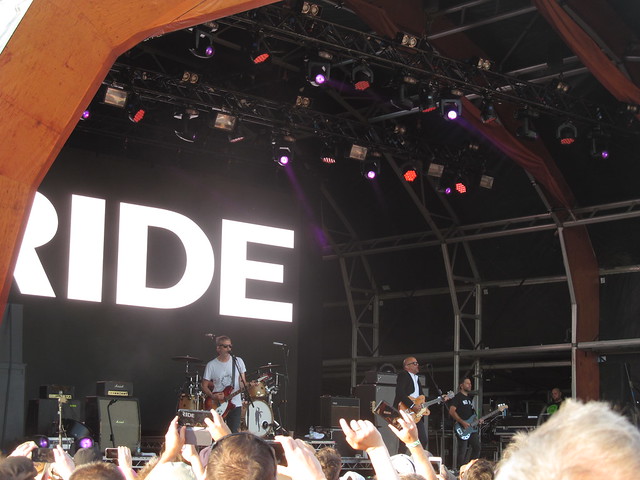
Thankfully, The Cure have suffered no dulling of the blade over the years. The recent “Curætion” show at the Festival Hall was a deep dive through the bands darker moments. This is the bands 40th Anniversary Birthday Show, marking 40 years (is it really that long?) since their first appearance as The Cure at the Crawley Rocket in 1978, yet also serving as an effective, in-front-of-your-eyes greatest hits reprise of the finest moments of their lives. Whilst the past ten years have seen the band retreat from new releases thanks to a combination of inertia caused by a significant and painful lineup change in 2010, the end of their record contract, and a desire to focus on music and not marketing, The Cure still don’t feel like a touring museum of music. The lineup has remained basically solid for a quarter century with only Reeves Gabrels as a ‘new’ addition at a mere seven years in the band. As such, it’s a definitive Cure show ; though, frustratingly, lacking in anything post 1993, apart from the singular “The End Of The World”.
In technical terms, the band play a show as good as any I have seen. The songs are also dispatched with the deftness of touch, and precision you expect from The Cure. I’ve never seen a bad Cure gig (though there are, occasionally off nights – Brno in 1998 was notoriously bad), but few have been as much fun. Some Cure gigs are really very very long indeed, and some feel even longer than that. Much as I love The Cure (over 25+ years, 8 lineups, and about 80 hours seeing them) there can on occasion be too much of a bad thing, and when the band are playing – say – “If Only Tonight I Could Sleep” at sunset on a Saturday – the main thought I have is that I can have a short break from something I love to recharge. The Cure rarely, if ever, leave you wanting more, and often play two shows in one, with a range of emotions, moving between one and the other fluidly. Set pacing is, and always has been an issue, as the odd summery pop single gets the entire crowd dancing and laughing, before it swiftly gets dispatched by the ten minute doomfest of “The Same Deep Water As You” (not aired tonight). Even a short set, by their standards can be forty six songs, and over three hours, long, with an encore longer than many bands entire gigs. Tonight, thankfully, its pure, undiluted Cure, with little in the way of the moments where you can obviously feel the audience and band drifting apart. A celebration of everything this band has done and how far they have come and what we have won by having them.
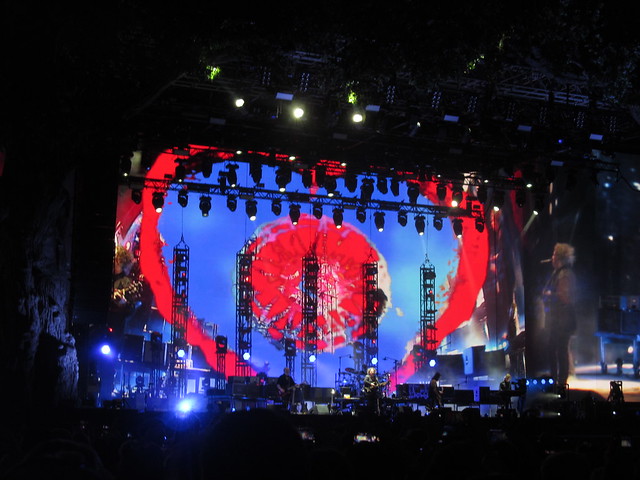
Perhaps the biggest issue in this celebration is the sheer size of the night : it’s nearly the biggest crowd I have seen them play to, and Robert Smith will never be Bono. If The Cure are playing to 800 or 80,000 people you get the same experience. And even though we have managed to get into the front enclosure, it still feels like standing at the back of Wembley Arena. The video screens have to pick up the slack, but they don’t : instead they act as an extension of the bands visual identity rather than reflecting the show back to the punters at the back of the huge field. While the band are rampaging through the first live outing for “Jumping Someone Else’s Train / Grinding Halt” in many, many years, most people are looking at poor quality VHS footage of the Brighton to London train journey from 1976 being projected onto video screens twice the size of your average block of flats. At one point, the screen is so big the band have six singers, six bass players, five keyboard players, five drummers, and five guitarists.
It’s not all fun. Put 80,000 people in a field all day with alcohol and sunshine, and there’s always going to be short tempers, punches thrown, and a bit of stupidity. We back away slowly from a man in a bad hat with a big mouth and someone else who stepped on his foot by mistake during “Push”. Nothing comes of it but we’re close to see something almost did. But its there, under the surface, growling for the rest of the night. Music may make all of us friends, but not always for long. Go Go Go, Push It Away. The joy with which this album deep cut is received tells us that The Cure aren’t just a band with people who ‘like’ them. Sometimes, The Cure go deep, and it doesn’t come from the number of people who like them, but how far into the soul that like goes. The Cure are a band that inspire a fervent devotion that some other bands could never achieve. Some other bands simply aren’t good enough.
That said, the band are solid, delivering almost all of their major songs in a ruthlessly efficieint, passionate way, exchanging the sly glances and injokes that only a long established group can make. This band have grown up in public, and with each other, and part of the glory of this is seeing The Cure become old and still retaining the same qualities they had when much, much younger. By the time of the encore, the band play 10 hit singles in a row. Just when you think you’ve had enough, BAM!, comes another, and another, and another, and you get to the end and you still wonder why they didn’t play “Mint Car” or “Lets Go To Bed”, or “Lovecats”, or “Primary”. And then, as the band are playing “10.15 Saturday Night” – seven minutes late at 10.22, clockwatchers – it’s fairly clear to me that when I was younger, I made the right choices. I fell in love with the right bands. I bought the right records. I’m in a field, with loads of my friends, happily playing air guitar and singing out of tune, and knowing that these, these are the moments. I’ll never get to my death bed, and think, I saw too many gigs. I’ll get to my death bed and know that This was a life I was blessed to live. Just like heaven.
